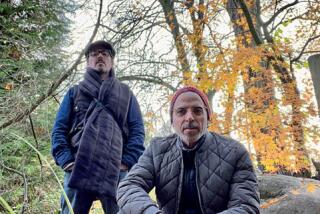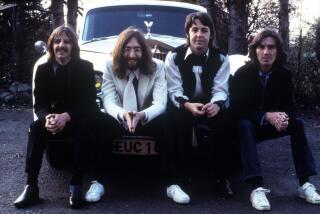By George and son
- Share via
London — London
Harrisongs, the business offices of the late George Harrison, occupies a suave building in a rich West London square dating from 1810-ish. It also houses the Beatles’ company, Apple, and the old Moptops’ spirit is pervasive.
On the stairway wall, black-and-white photographs from Hamburg, 1960 -- grease-and-leather Harrison with Lennon and ill-fated “fifth Beatle” Stuart Sutcliffe. All of them gone....
A movement catches my eye. I look up -- and nearly fall down.
George Harrison is standing at the top of the stairs, and time’s gone all back-to-the-future.
Until George says, “Hello, I’m Dhani.”
Fortunately, the former Beatle’s son is used to startled looks. He offers a handshake and a cup of Earl Grey tea. Later he mentions that reactions to his appearance trouble him only when they carry twisted implications that the resemblance is somehow a career move. “It’s genetic!” he insists, not unreasonably. “He’s my dad!”
It’s hardly surprising that his father crops up in the present tense often, because Dhani has spent much of the past year immersed, with George’s old Traveling Wilburys pal Jeff Lynne, in co-producing his father’s new album, “Brainwashed,” which will be released Tuesday, 10 days before the first anniversary of George’s death from cancer in Los Angeles. (See accompanying review.) U.S. retailers were hesitant to predict a sales figure but suggested that it might debut in the Top 10.
Dhani, 24 and still living at his parents’ home (his mother is Harrison’s second wife, Olivia Arias Harrison), has never done interviews before. He talks fluently, joking about his motor mouth, yet it’s obviously not easy for him. “If I felt the way I do now, I wouldn’t have attempted to finish the record,” he admits. “I’m sort of worn out and sad.”
His consolation is his father’s philosophy and conduct in extreme adversity.
Dhani points out that George wrote and recorded a song called “Art of Dying” way back in the early ‘70s. Reflecting his study of Eastern religions, chiefly Hinduism and Buddhism, George said years ago that the lyric was about being able to “consciously leave the body at death” and rising above the distraction of mundane thoughts.
Well, spiritual exercises are one thing but, says Dhani, his father’s faith held, from the 1998 cancer diagnosis until the end: “He never flinched. He never felt sorry for himself. He never lost his sense of humor. He wasn’t afraid of death, his own mortality, although he was very aware of it. He wasn’t even attached to his body, if you know what I mean. We’d be in the kitchen and he’d say, ‘Dhan, you know we are not these bodies, don’t you?’
“And that carried over to the final stage where you have to lose your loved ones. As everyone in the world has to. But the more prepared you are the better. It’s like training for the Olympics. That’s what he did mentally his whole life ... and he pulled it off, happily and in the most exemplary way you ever could.”
The album grew directly from the home-based life George Harrison chose for his last 10 years -- especially from his close relationship with his only child, built across what might have proved a wide generation gap between the Liverpool bus driver’s son, who used to take his weekly bath in a tin tub in front of the living-room fire, and the superstar’s son, who grew up in a mansion.
George showed Dhani the rudiments of guitar when he was 9: “He never pushed me, just left me to learn or not. The main thing was he was always around the house, playing his ukulele and smiling. I’d come home from school and he’d be standing in the doorway playing his uke.
“We’d play together all the time. And listen to records. Hoagy Carmichael, Cab Calloway, Nina Simone, Big Bill Broonzy. Bix and Bing. Stuff you wouldn’t ordinarily play to kids. I loved it. He wasn’t a big fan of contemporary music -- Massive Attack or Tricky, who I like a lot -- but we could listen to Beck together. My friends got into all that music too because ... my dad was very cool with them.”
In the early ‘90s, George grew sick of both the music and movie businesses. (His production company, HandMade Films, declined after a run of successes beginning with Monty Python’s “Life of Brian.”) His previous solo album was 1987’s “Cloud Nine”; his last tour was with Eric Clapton in Japan in 1991.
He’d say things like, “In my garden I feel great, then if I go outside the gate I wonder what the hell I’m doing there.”
But Dhani reckons his father’s reclusive reputation was misleading. George remained a prolific traveler. To him, “home” was not only Friar Park in leafy Berkshire, but also houses in Hawaii, Australia and Switzerland.
“Although he did feel like a big outsider to the entertainment industry, he wasn’t hiding, he was just doing what he wanted to do -- planting trees and making music,” says Dhani. “Trees replaced music as his work. Japanese maples. We bought a couple of thousand of them. He’d be out in the garden digging, on his hands and knees planting every night until the light went. My mother and me too, we were a real team.”
But the music never stopped. He strummed, he wrote songs; second nature. Then, when he was remastering 1970’s “All Things Must Pass” in 2000, he decided he would like to put a new album together.
“He used to say, ‘Oh, you’re going to have to finish all these songs.’ I’d be like, ‘Well, not if you do it first -- get off your arse and finish them!’ ” Dhani laughs. “We had a lot of time where we were very close. We talked about everything. And we’d played the songs together and discussed them so much that I had a very good idea of what he wanted.”
George recorded until two months before he died and left tapes of his vocals and guitar (and ukulele, of course), plus a track listing and even a recording schedule with a November 2002 release date. After his death, Dhani and Jeff Lynne decided to stick to the plan.
They settled in at Lynne’s Los Angeles studio to add and edit.
“The energy and momentum was there,” says Dhani. “It was like, oh
After the Royal Albert Hall, London, memorial concert on Nov. 29 featuring Paul McCartney, Ringo Starr, Lynne, Clapton and more, Dhani’s off on vacation. Then he makes a start with a design company he co-founded (he’s a Brown University design and physics graduate).
“The record may not change your life, but it certainly changed mine,” he concludes, relieved, his task complete. Filial duty, honor and love all satisfied.
More to Read
The biggest entertainment stories
Get our big stories about Hollywood, film, television, music, arts, culture and more right in your inbox as soon as they publish.
You may occasionally receive promotional content from the Los Angeles Times.









